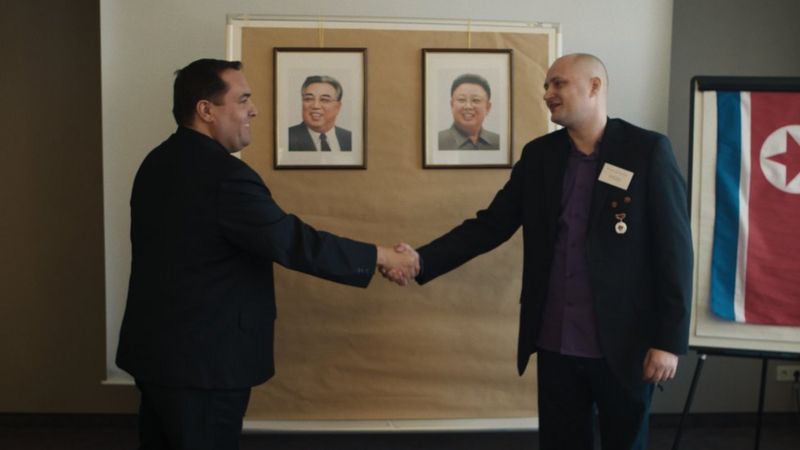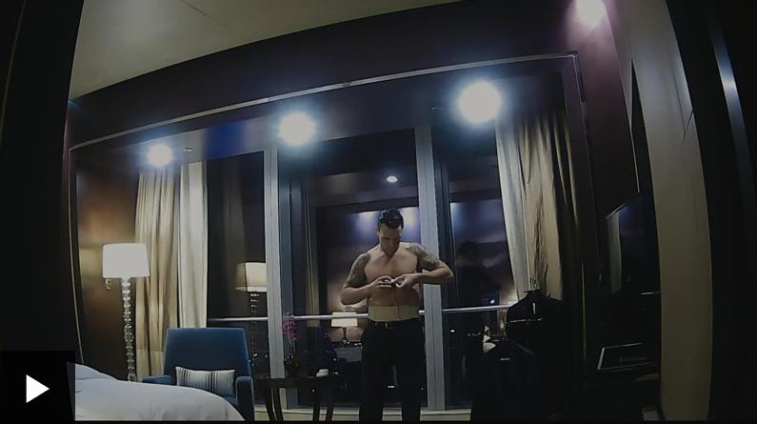A new documentary with a bizarre cast of characters claims to shed light on North Korea's efforts to evade international sanctions, by tricking members of Kim Jong-un's secretive regime into signing fake arms deals.
The film features an out-of-work Danish chef fascinated by communist dictatorships; a Spanish nobleman and North Korean propagandist with a penchant for military uniform; and a former French legionnaire and convicted cocaine dealer who plays the part of an international man of mystery.
But could it all be true? One former UN official told the BBC he found it "highly credible".
The film, titled The Mole, is the work of maverick Danish film maker Mads Brügger, who says he orchestrated a complex three-year sting operation to reveal how North Korea flouts international law.
The out-of-work chef fascinated by communist dictatorships is Ulrich Larsen, who, with Brügger's help, infiltrates the Korean Friendship Association, a pro-regime group based in Spain. Larsen moves up the ranks and ultimately wins the favour and apparent trust of North Korean government officials.
Membership of the KFA brings Larsen into contact with its flamboyant founder and president, Alejandro Cao de Benós, a Spanish nobleman known around the world as "the Gatekeeper of North Korea".
During the film, in which he is sometimes seen in North Korean military uniform, Cao de Benós boasts of his access and influence with the regime in Pyongyang.

Then there is Jim Latrache-Qvortrup, described as a former French legionnaire and convicted cocaine dealer. Latrache-Qvortrup is hired to play the part of an international arms dealer, which he does in an assortment of flashy suits.
Pulling the strings is Brügger himself, who calls himself "the puppet master". He claims to have spent 10 years working on his film - now a joint production by the BBC and Scandinavian broadcasters.
The film is funny, grotesque and at times barely credible. "I am a film maker who craves sensation," Brügger admits in the film.
But Hugh Griffiths, who was co-ordinator of the UN Panel of Experts on North Korea between 2014 and 2019, called the revelations in the film "highly credible".
"This film is the most severe embarrassment to Chairman Kim Jong-un that we have ever seen," said Griffiths. "Just because it appears amateurish does not mean the intent to sell and gain foreign currency revenue is not there. Elements of the film really do correspond with what we already know."

North Korea has been under UN sanctions since 2006 because of its nuclear ambitions - its development and testing have been documented in regular reports by a Panel of Experts since 2010. But it is unprecedented to see North Korean officials, on film, discussing how to evade sanctions in order to export weapons.
In one key moment in the film, Ulrich Larsen, the former chef and "The Mole" of the title, films as Jim Latrache-Qvortrup, aka "Mr James" the arms dealer, signs a contract with the representative of a North Korean arms factory, with government officials present. The encounter takes place in a gaudy basement restaurant in a Pyongyang suburb.
Not all the Koreans present are properly identified, and, laughing about it afterwards, Latrache-Qvortrup says he had to invent a company name when grilled by one of the Korean officials. It seems incredible the team would not have given any previous thought to such a basic detail, just as it stretches credulity to think that genuine Korean officials would allow such a meeting to be filmed and for documents to be signed and exchanged.
The signed document bears the signature of Kim Ryong-chol, president of Narae Trading Organisation. Narae is a common name on the Korean Peninsula, but the most recent UN Panel of Experts report, dated 28 August 2020, says that a company called Korea Narae Trading Corporation "is engaged in sanctions evasion-related activities for the purposes of generating revenue that supports the prohibited activities of the Democratic People's Republic of Korea".
Griffiths, the former UN official, said it was telling that the Koreans present were apparently willing to deal with a private businessman about whom they knew nothing.
"It shows that UN sanctions are working. The North Koreans are clearly desperate to sell their weapons," he said.

At one point, during a meeting in Kampala in 2017, Latrache-Qvortrup is asked by "Mr Danny" (described as a "North Korean arms dealer") whether he would be able to deliver North Korean weaponry to Syria. The question reflects North Korea's increasing difficulty in doing this for itself, Griffiths said.
"Mr James" is in Uganda, accompanied by some of the same North Korean officials seen in Pyongyang, to discuss the purchase of an island in Lake Victoria. Ugandan officials are told it's for the construction of a luxury resort, but Mr James and the Koreans are secretly planning to build an underground factory to manufacture weapons and drugs.
Again, it seems fantastical, but North Korea has done this sort of thing before. The regime built an ammunition factory at a disused copper mine in the Leopard Valley in Namibia. Ostensibly, they were in the country to build statues and monuments.
The activities of the Korea Mining Development Trading Corporation (Komid) were investigated by the UN Panel of Experts between 2015 and 2018. UN pressure on Namibia may help explain why the North Koreans, who in the film initially suggest building there again, switched their attention to Uganda, said Griffiths.
"North Korean projects in Namibia were effectively shut down," the former UN official said. "By 2018, Uganda was one of the very few African countries… where North Korean arms brokers could still travel at will."

Another aspect of the film of interest to international observers is the apparent involvement of accredited North Korean diplomats in embassies abroad in facilitating efforts to violate UN sanctions. In one sequence, Ulrich Larsen visits the North Korean embassy in Stockholm, where he receives an envelope of plans for the project in Uganda from a diplomat described as Mr Ri.
Like many of the documentary's key scenes, the encounter is secretly filmed by Larsen. As he leaves, Mr Ri warns him to be discreet.
"If something happens, the embassy knows nothing about this, OK?" Mr Ri says.
According to Griffiths, the sequence "fits a pattern".
"The vast majority of sanctions investigations by the UN Panel found that North Korean diplomatic premises or passport holders were involved in the actual or attempted violations," he said.
None of the deals discussed in the film ever come to fruition. Eventually, as partners start to demand money, Brügger makes "Mr James" disappear. The filmmakers say their evidence has been presented to the North Korean embassy in Stockholm, but there has been no response.
Cao de Benós, the founder of the KFA, said that he was "play acting" and that the film was "biased, staged and manipulate".
Latest Stories
-
Styrofoam Ban: I-DIEM Africa lauds President Mahama
30 minutes -
Trump’s travel ban strains US-Africa relations
41 minutes -
UGBS, MIG, ASoE partner to equip students with leadership skills
56 minutes -
Bank of Ghana directs banks to review pricing model for customers
1 hour -
BoG says 2024 financial year saw improved performance despite loss
1 hour -
Private sector eager, prepared to work with the government to boost production – GNCCI
2 hours -
Trade Minister spotlights Ghana’s entrepreneurial progress in the USA
2 hours -
Cedi’s sharp appreciation may undermine gains from upcoming cocoa price hike – COCOBOD
2 hours -
Ghana advances sustainable e-waste practices
2 hours -
Fuel Levy a betrayal after fare reduction – GPRTU accuses government
2 hours -
Plastic Industry cautions against hasty styrofoam ban
2 hours -
We will adhere to zero financing of budget – BoG
2 hours -
Greater Accra: Ambulance shortage forces dispatchers to prioritise only critical cases
2 hours -
The ecological situation is dire and we need robust action – Awula Serwah
2 hours -
Trump and Musk trade insults as row erupts in public view
3 hours

